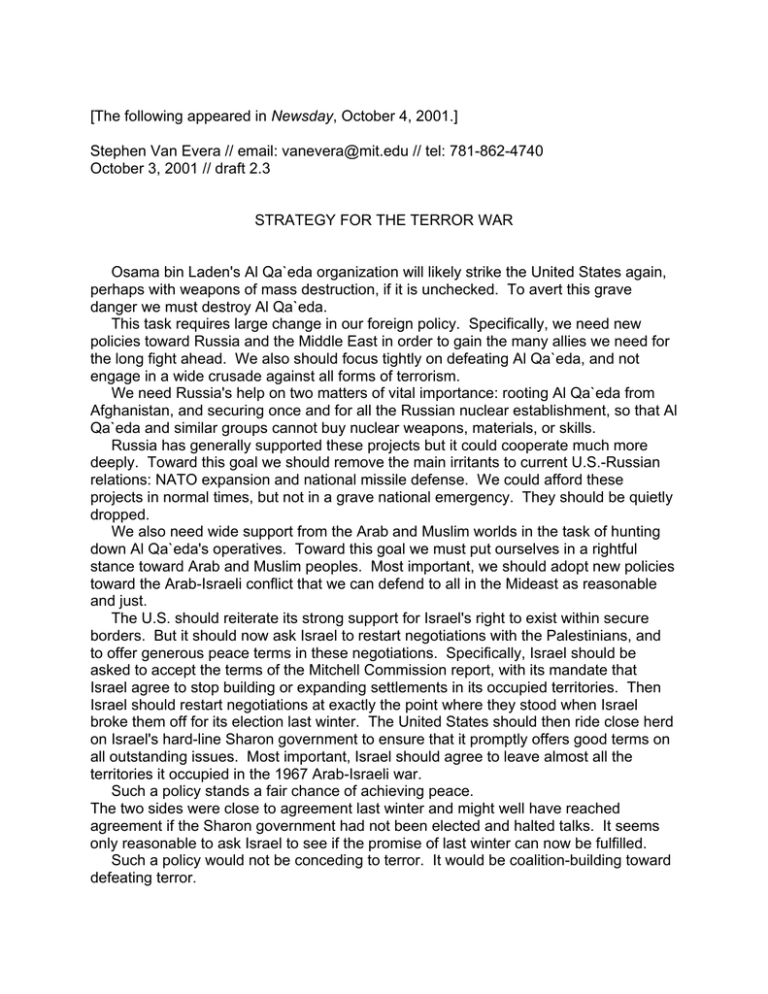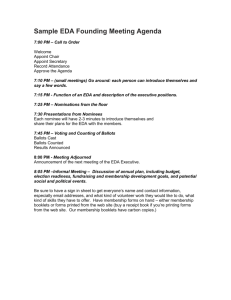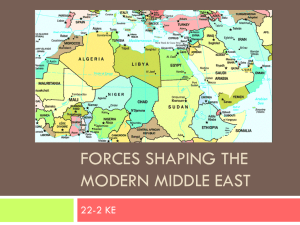Newsday Stephen Van Evera // email: // tel: 781-862-4740
advertisement

[The following appeared in Newsday, October 4, 2001.] Stephen Van Evera // email: vanevera@mit.edu // tel: 781-862-4740 October 3, 2001 // draft 2.3 STRATEGY FOR THE TERROR WAR Osama bin Laden's Al Qa`eda organization will likely strike the United States again, perhaps with weapons of mass destruction, if it is unchecked. To avert this grave danger we must destroy Al Qa`eda. This task requires large change in our foreign policy. Specifically, we need new policies toward Russia and the Middle East in order to gain the many allies we need for the long fight ahead. We also should focus tightly on defeating Al Qa`eda, and not engage in a wide crusade against all forms of terrorism. We need Russia's help on two matters of vital importance: rooting Al Qa`eda from Afghanistan, and securing once and for all the Russian nuclear establishment, so that Al Qa`eda and similar groups cannot buy nuclear weapons, materials, or skills. Russia has generally supported these projects but it could cooperate much more deeply. Toward this goal we should remove the main irritants to current U.S.-Russian relations: NATO expansion and national missile defense. We could afford these projects in normal times, but not in a grave national emergency. They should be quietly dropped. We also need wide support from the Arab and Muslim worlds in the task of hunting down Al Qa`eda's operatives. Toward this goal we must put ourselves in a rightful stance toward Arab and Muslim peoples. Most important, we should adopt new policies toward the Arab-Israeli conflict that we can defend to all in the Mideast as reasonable and just. The U.S. should reiterate its strong support for Israel's right to exist within secure borders. But it should now ask Israel to restart negotiations with the Palestinians, and to offer generous peace terms in these negotiations. Specifically, Israel should be asked to accept the terms of the Mitchell Commission report, with its mandate that Israel agree to stop building or expanding settlements in its occupied territories. Then Israel should restart negotiations at exactly the point where they stood when Israel broke them off for its election last winter. The United States should then ride close herd on Israel's hard-line Sharon government to ensure that it promptly offers good terms on all outstanding issues. Most important, Israel should agree to leave almost all the territories it occupied in the 1967 Arab-Israeli war. Such a policy stands a fair chance of achieving peace. The two sides were close to agreement last winter and might well have reached agreement if the Sharon government had not been elected and halted talks. It seems only reasonable to ask Israel to see if the promise of last winter can now be fulfilled. Such a policy would not be conceding to terror. It would be coalition-building toward defeating terror. Furthermore, such a policy would be more helpful than hurtful to Israel. The occupied Arab territories are a poison pill that Israel unwisely swallowed to appease its own extremists. Continued Israeli occupation poses a threat to Israeli security by driving the Arab world into greater unity against Israel, and by impeding a peace settlement. And without peace Israel faces the long-term risk of a new Mideast war or a nuclear terrorist attack on Israel. So the U.S. actually helps Israel by moving it to disgorge its poison pill. Moreover, Israel has a large interest in seeing the U.S. effort against Al Qa`eda succeed. This gives Israel a large interest in ending an occupation that impedes the U.S. against Al Qa`eda by alienating Arabs and Muslims from both Israel and the U.S. The United States should also consider ways to remove other irritants to its relations with the Arab and Muslim worlds. For example, the U.S confrontation with Iraq has played very badly for the U.S. in the Arab media, which reiterates Saddam Hussein's deceitful propaganda claiming that the U.S.-led sanctions are responsible for killing Iraqi children. The U.S. should consider how this sanctions effort can be better explained to the Arab-Muslim publics, or whether new terms for ending it should be offered. And the U.S. should consider whether basing U.S. forces in Saudi Arabia remains worth the cost of the friction that the U.S. presence engenders. Further, the U.S. should consider ways to help Arab and Muslim societies to exclude decadent aspects of American culture--Baywatch, MTV and so forth--that these cultures understandably find offensive. Specifically regarding Pakistan, the United States should move strongly to legitimate the Musharraf government's decision to support the U.S. effort against Al Qa`eda. The Bush Administration wisely lifted economic sanctions against Pakistan last month. Now it should also lift U.S. restrictions on textile imports from Pakistan. This would boost the incomes of many of Pakistan's poorest people. To support its policies the U.S. should mount a sustained campaign in the Arab and Muslim media to inform Arabs and Muslims about Al Qa`eda's cruelties. Few in the Arab-Muslim world remember that Al Qa`eda murdered hundreds of innocent Africans in its 1998 bombings of two U.S. embassies; they should be shown the faces of the victims and hear the grieving of their loved ones. Few Muslims know that scores of Muslims died in the September 11 attacks; they should be informed. Few know that Bin Laden calls for using weapons of mass destruction against civilians; the profound immorality of this idea should be discussed. Moderate Muslim clerics should be given forums to explain the ways that Al Qa`eda violates Muslim teachings. In short, the U.S. should adopt a strategy of pulling Arab and Muslim societies away from the extremists, to drain the sea in which the extremists swim. Such a strategy requires that the U.S. adopt policies toward the Mideast that Arabs and Muslims widely regard as legitimate and fair. History shows that successful action against terror requires that states fighting terror must first legitimate their policies in the eyes of the societies where the terror breeds. All aspects of U.S. policy should reflect this reality. On another front, the U.S. should demand universal cooperation with a new world banking regime that ends all offshore banking havens where terrorists can store money without fearing U.S. seizure. Al Qa`eda paid for its violence with monies held in these banking havens. In the future any state that acts as a banking haven should be held accountable for terror committed with monies it holds in custody. Last month the Bush Administration announced a policy of sanctioning banks that act as havens. We should expand this policy to also target states that fail to move strongly against haven banks on their territory. Above all the U.S. must not define its enemies broadly in the Middle East. Instead it must focus on destroying Al Qa`eda. It should ask all others to help in this task-including some with dark records. The Bush administration is wisely focusing on Al Qa`eda for now, but some in the administration still favor a wide attack on all Middle East terrorists. Such a course would spiral the U.S. into ever-deeper conflict with uncounted Arab and Muslim peoples whose interests and feelings we barely understand. Indeed, Al Qa`eda may hope to bait us into this mistake. Instead we must limit ourselves to destroying those terrorists who can and will bring terror to the U.S. homeland. Only Al Qa`eda and its affiliates fit that description today and they should be our only target for now. We should target other groups only when they pose a parallel danger, and should target states only if they persist in fostering such danger. ----------------Stephen Van Evera is associate professor of political science at MIT. 1282 words








